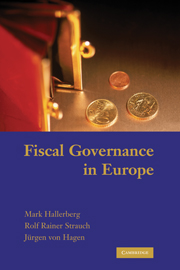Book contents
- Frontmatter
- Contents
- Acknowledgments
- 1 INTRODUCTION
- 2 ELECTORAL AND FISCAL INSTITUTIONS AND FORMS OF FISCAL GOVERNANCE
- 3 AN ACCOUNT OF FISCAL NORMS AND RULES IN THE EUROPEAN UNION FROM 1985 TO 2004
- 4 HOW FORMS OF FISCAL GOVERNANCE AFFECT FISCAL PERFORMANCE
- 5 WHY DO COUNTRIES HAVE DIFFERENT FISCAL INSTITUTIONS?
- 6 INSTITUTIONAL CHOICE IN NEW DEMOCRACIES: FISCAL GOVERNANCE IN CENTRAL AND EAST EUROPEAN COUNTRIES
- 7 EMU AND FISCAL GOVERNANCE IN EUROPE
- 8 CONCLUSION
- Bibliography
- Index
- Cambridge Studies in Comparative Politics
8 - CONCLUSION
Published online by Cambridge University Press: 04 August 2010
- Frontmatter
- Contents
- Acknowledgments
- 1 INTRODUCTION
- 2 ELECTORAL AND FISCAL INSTITUTIONS AND FORMS OF FISCAL GOVERNANCE
- 3 AN ACCOUNT OF FISCAL NORMS AND RULES IN THE EUROPEAN UNION FROM 1985 TO 2004
- 4 HOW FORMS OF FISCAL GOVERNANCE AFFECT FISCAL PERFORMANCE
- 5 WHY DO COUNTRIES HAVE DIFFERENT FISCAL INSTITUTIONS?
- 6 INSTITUTIONAL CHOICE IN NEW DEMOCRACIES: FISCAL GOVERNANCE IN CENTRAL AND EAST EUROPEAN COUNTRIES
- 7 EMU AND FISCAL GOVERNANCE IN EUROPE
- 8 CONCLUSION
- Bibliography
- Index
- Cambridge Studies in Comparative Politics
Summary
This book has developed a theory of fiscal governance. By “governance” we mean the package of rules, norms, and institutions that structure the way governments make a budget. We argue that the way governments decide on budgets affects the content of the budgets that are implemented. Decentralized fiscal governance, which we refer to as fiefdom, leads to more spending and larger budget deficits than the decision makers themselves want. The reason for this is the existence of a common pool resource problem. When such a problem exists, policymakers consider the full benefits of their spending decisions but only part of the tax burden. Centralization of the decision-making process reduces the size of the common pool resource problem.
We indicate that there are two ideal forms of fiscal governance that can provide this budget centralization. Delegation occurs when decision makers delegate power to one central player in the budget process who has the responsibility to consider the full tax burden. In practice, this person is usually the finance minister. Our study indicates that delegation is especially strong in countries such as the United Kingdom and France. Fiscal contracts occur when the political parties that form the government commit themselves to targets that are intended to last the life of the coalition. Such contracts are especially strong in the Netherlands and Finland.
The choice between these forms of fiscal governance depends upon the underlying political structures of a given country. There is a potential principal-agent game that affects how a form of fiscal governance functions.
- Type
- Chapter
- Information
- Fiscal Governance in Europe , pp. 199 - 212Publisher: Cambridge University PressPrint publication year: 2009

